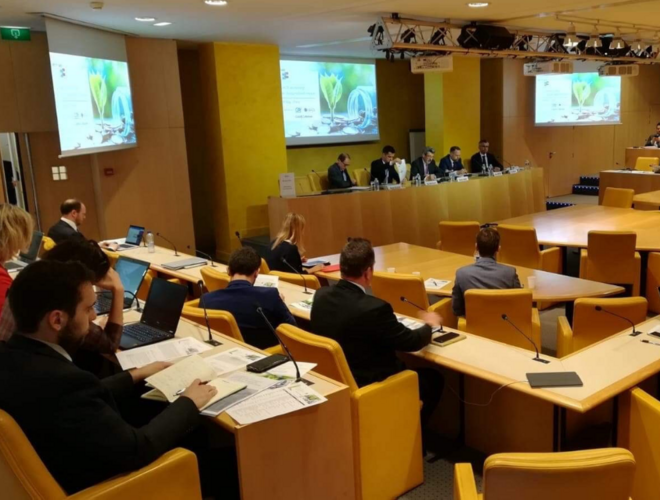Friday, 24th of May : Today, the European Association of Co-operative Banks (EACB), in collaboration with its three French members Crédit Agricole, Crédit Mutuel and BPCE, organised a workshop on Sustainable Finance in Paris. The event was an occasion to tackle the momentum and discuss, at a crucial point in time, the numerous initiatives launched by the EU Institution and international players in order to mobilise financing of sustainable projects on a global scale. Channelling public and private funds is considered indispensable for reaching tangible results in the fight against climate change according to the Paris Agreement and the Sustainable Development Goals.
The EABC was really honored to welcome Sylvie Goulard, Deputy Governor of Banque de France, as key note speaker. Banque de France plays a leading role in climate financing, financing transition opportunities and in addressing climate risks. Her involvement in the dialogue with co-operative banks is very precious.
Today’s meeting has been an important occasion of dialogue with the regulators. The following topics were tackled: i) addressing climate risk: the supervisors’ approaches and challenges, ii) the new sustainability framework for investment services and the impact on co-operative banks and iii) Principles for Sustainable and Responsible Banking.
As a result of the fruitful exchange, the EACB Members have identified the priorities in order to move forward the EU agenda and issued the “Co-operative banks’ declaration on sustainable finance - Co-operative banks’ policy priorities for greening the financial system” that you can download on the EACB website.
Hervé Guider, EACB General Manager stated: “Finance is an important tool among many others to reach sustainable development goals, since the transformation of our current economy requires huge investments. Measures related to sustainable finance should create incentives for the transition to a sustainable economy and not new regulatory constraints. Considering the structure of the EU economy based on banks financing, co-operative banks underline the key role that they can play in making the energy transition possible at local level. Key ”decentralised” activities –such as mortgages for energy efficiency, installation of solar panels, biomass power or households saving products linked to sustainability – can only be achieved via the mobilisation of and a favourable regime for local and regional banks. But if co-operative banks are ready to take their share of responsibility for the energy transition, they stress that this energy transition is a societal issue involving a multitude of players. The difficulties in achieving the objectives of COP21 must be addressed within a broader framework than just the banking sector.”



